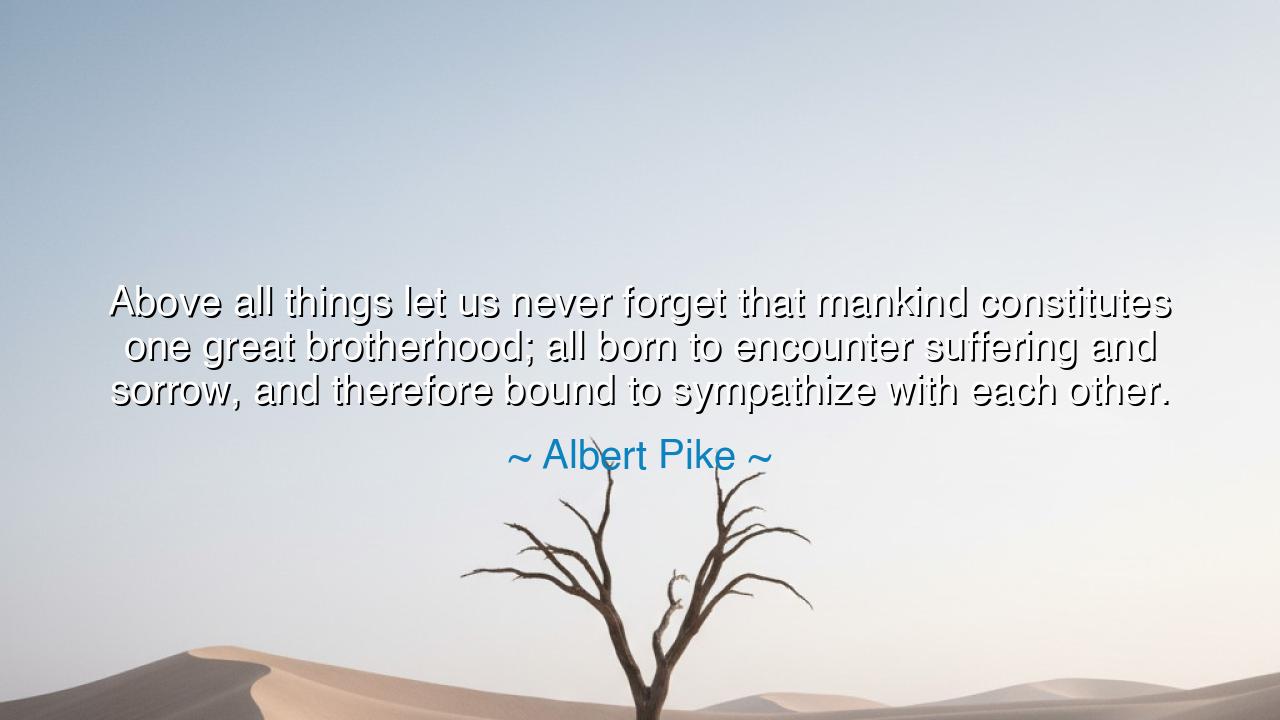
Above all things let us never forget that mankind constitutes one
Above all things let us never forget that mankind constitutes one great brotherhood; all born to encounter suffering and sorrow, and therefore bound to sympathize with each other.






In the quiet light of reflection, Albert Pike, the philosopher, jurist, and mystic of the nineteenth century, offered a truth that burns brighter than all monuments: “Above all things let us never forget that mankind constitutes one great brotherhood; all born to encounter suffering and sorrow, and therefore bound to sympathize with each other.” These words, drawn from the deep wells of moral wisdom, remind us that the bond of humanity transcends all divisions of color, creed, and nation. Pike’s message is both tender and powerful: that we are joined not by fortune or triumph, but by the shared burdens of suffering and sorrow — and that from this shared struggle arises our sacred duty to sympathize, to care, to uplift.
To understand the origin of this quote, one must understand the heart of the man who spoke it. Albert Pike lived in a time when the world was torn by conflict and prejudice — the nineteenth century, when the old empires were breaking, and America itself was divided by civil war. Pike, though a soldier and statesman, was above all a student of human nature, one who saw beyond the noise of battle and the illusions of pride. In his writings, especially those inspired by his work within Freemasonry, he sought to unite men not through religion or politics, but through universal moral truth — the idea that all human beings, whatever their station, are children of the same divine origin, travelers on the same perilous road, and heirs to the same destiny of compassion.
Pike’s words echo the wisdom of the ancients. The Stoic philosopher Marcus Aurelius once wrote, “We are made for cooperation, like feet, like hands, like eyelids.” The Buddha, centuries earlier, taught that life is suffering, and that compassion — the ability to feel another’s pain as one’s own — is the path to peace. Pike joins this eternal chorus of sages who understood that pain is the great equalizer, and that in the crucible of sorrow, all distinctions fade. For in grief, the king and the beggar are alike; in death, the conqueror and the conquered share the same silence. Thus, if we are all bound to suffer, we are also bound to love — for only love can make suffering bearable.
Consider, then, the story of the Christmas Truce of 1914, when soldiers on both sides of the Great War — men who had been commanded to hate and to kill — laid down their arms, crossed the trenches, and shared bread and song. They saw, if only for a night, that their enemies were not monsters but men: cold, weary, and afraid, like themselves. It was humanity revealing itself through the cracks of war, a living testament to Pike’s vision of the great brotherhood of mankind. Though the truce was brief, its memory endures as proof that compassion is stronger than command, and that sympathy is the true law written upon the human heart.
In Pike’s words, there is no illusion of perfection; he does not claim that mankind will ever escape sorrow. Rather, he insists that sorrow itself is what makes us kin. Our struggles are not punishments but threads — woven together, they form the tapestry of human experience. Each act of kindness, each gesture of understanding, strengthens that fabric. When one suffers, all are diminished; when one is comforted, all are lifted. This is the eternal covenant of empathy — that to live rightly is to feel deeply for others.
Yet in our modern age, this truth grows faint beneath the noise of pride and division. Nations arm themselves against neighbors, ideologies pit brother against brother, and the cry of the suffering is often drowned by indifference. But Pike’s wisdom calls across the centuries, reminding us that to forget our shared humanity is to lose our very soul. Compassion is not weakness — it is strength. Sympathy is not sentiment — it is wisdom. Only by seeing ourselves in others can we begin to heal the wounds of the world.
The lesson, then, is both simple and profound: remember the brotherhood of man. When you see another in pain, do not turn away; their sorrow is a mirror of your own. When you encounter anger, look beneath it, and you will often find fear or loss. Act not out of judgment, but out of understanding. Seek connection, not conquest; healing, not harm. For the greatness of a person — or a nation — is measured not by wealth or might, but by the capacity to feel for others.
So, my children of the future, let the voice of Albert Pike guide you as a beacon in dark times: never forget that you are bound to all who breathe. Your joys are shared, and your sorrows are shared. Let compassion be your sword and kindness your shield. For when humanity remembers that it is one great brotherhood, divided no longer by hatred but united by empathy, then — and only then — will peace cease to be a dream, and become the natural order of the human heart.






AAdministratorAdministrator
Welcome, honored guests. Please leave a comment, we will respond soon